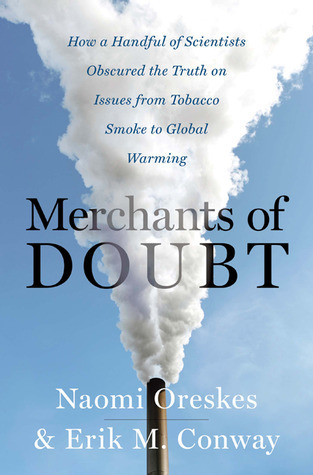Merchants of Doubt Book Summary
How a Handful of Scientists Obscured the Truth on Issues from Tobacco Smoke to Global Warming
TL;DR
Merchants of Doubt exposes how a small group of scientists has misled the public on critical issues like tobacco smoking and global warming, driven by corporate interests and ideological biases, obscuring well-established facts.
What is Merchants of Doubt about
In "Merchants of Doubt," authors Naomi Oreskes and Erik M. Conway delve into the troubling history of how a small contingent of scientists has systematically cast doubt on significant scientific findings related to public health and environmental issues. This group, often connected to industries such as tobacco and fossil fuels, has engaged in a campaign of misinformation that mirrors its denial of the dangers of smoking and climate change. Oreskes and Conway meticulously reveal the tactics employed by these individuals, including the manipulation of media narratives and the exploitation of public skepticism, to undermine well-documented science for decades. Their work reveals the dangerous intersection of science, politics, and corporate interests, highlighting the urgent need for transparency in scientific discourse.
Merchants of Doubt 8 Key Takeaways
Historical manipulation of science
The book charts a history of how certain scientists misrepresented scientific evidence to protect corporate interests, particularly in the tobacco and fossil fuel industries.
Doubt as a product
The phrase 'Doubt is our product' illustrates how these scientists crafted uncertainty around established facts, thus prolonging debate and delaying policy change.
Media complicity
The authors argue that mainstream media often played into the hands of these doubt merchants by giving them platforms, thus skewing public perception and understanding.
Repeat offenders
Notably, many individuals involved in the denial of tobacco's dangers also disputed climate change, demonstrating a pattern of behavior linked to financial incentives.
Ideological motives
The book highlights the ideological biases that drove these scientists, often aligned with conservative political views that favored deregulation and corporate freedoms.
Impact on public policy
The tactics employed by these scientists have had significant repercussions on public health and environmental policy, hindering progress on crucial issues.
Importance of scientific integrity
Oreskes and Conway underscore the necessity for honesty in scientific communication, advocating for a society that values facts over ideology.
Call to action
The authors conclude with a plea for greater awareness and vigilance in recognizing and counteracting the manufacture of doubt in public discourse.
Top Merchants of Doubt Quotes
- "Doubt is our product, and we deliver it to the public in a way that obscures the truth."
- "When it comes to science and policy, the truth is often the first casualty of corporate interests."
- "The manipulation of public opinion is a powerful tool in the hands of those with a vested interest in maintaining the status quo."
Who should read Merchants of Doubt?
This book is essential for readers interested in understanding the intersection of science, politics, and media. It appeals to those concerned with public health, environmental issues, and the integrity of scientific communication. Readers will gain insights into the mechanisms of misinformation and the importance of critical thinking in the face of conflicting narratives.
Merchants of Doubt Best Reviews
- "A compelling examination of how a small group of scientists created doubt about clear scientific evidence, revealing deep connections between politics and corporate interests." - The New York Times
- "An essential read for anyone wanting to understand the complexities of scientific truth in the face of deliberate misinformation." - Scientific American
- "Oreskes and Conway provide a meticulous investigation into the dark art of doubt-making, an eye-opening narrative that is both alarming and enlightening." - Nature
People also liked these summaries
Merchants of Doubt FAQs
What is the central theme of Merchants of Doubt?
The central theme is how a small group of scientists has obscured the truth about critical issues like tobacco and climate change, driven by corporate interests and a political agenda.
How does the book address the media's role in the spread of misinformation?
The authors argue that the media has often provided a platform for those promoting doubt, prioritizing sensationalism over factual accuracy, which has distorted public understanding.
What impact has this campaign of misinformation had on public policy?
The tactics employed by these doubt merchants have delayed significant public health and environmental policy changes, negatively impacting society's response to pressing issues such as climate change.
